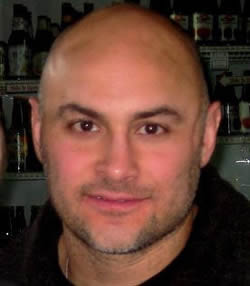|
Since "El Camino" is set in the fields of Oregon at a paisa migrant campo, and this is the season where that type of labor (however hidden the real reason) has been put to question by politicians and pundits, I can understand how someone might read the story suspicious of its timing. There's opportunism going on here, the cynic might accuse. But in fact, I'd started thinking of the story while recalling something my father had done over a dozen years ago, one of many acts of beauty of his I've witnessed in my life, along with (as it conversely goes with survivors of life's horrors) plenty of ugliness.
I'm working on an epic novel now about my father's life, the life before I'd ever met him. It is, I must admit, a tough book to write. I started the novel during the winter of 2010, and in that time have simultaneously preoccupied myself with writing other books, such that my computer screen, more often than not, has been divided by two novel projects, or a novel and a story, or a novel and a play, or a novel and a poem. In that time, I've finished three other novels, published two, and also finished a story collection (of which "El Camino" is a part), a poetry collection and a play. One way to look at my creative output over the last eight years is that I've been avoiding writing by writing.
One of the many problems I'm having with this particular book is that it's emotionally charged with the terrible suffering of people I love. The story is stuffed with dumpster-diving tales of immigrant poverty; familial deaths by the dearth of good medicine and good police; the fracturing of a family line by more death, the children spread across the greater western hemisphere of the United States; youth incarceration in draconian third-world conditions; more death, too much death, in war. By writing the book, it feels as if I'm revisiting pain on people who are already too worn out, as it is, to be revisited by anything. Who are lucky just to be alive. The silence they've kept somewhat reinforces the idea that survival, just barely, is enough.
Another problem is how I was raised. In a Fa'a Samoa household, loyalty to the clan is paramount: one doesn't talk to outside parties about failure, pain, tumult, chaos, violence. In a lot of ways, philosophically speaking, that type of tribal thinking is perfectly defensible. The rub here is America itself: when third-world cultural mores are transcribed to this lucky country, there is often a lot of failure, pain, tumult, chaos, violence. As one of those family members who happens to be a writer, the larger complication is that the grist of my craft comes directly of that failure, pain, tumult, chaos, violence. I call it the hard side of good storytelling.
What keeps me digging in to the book is what I hope to be the soft side of good storytelling. In the early 2000s, my father decided to sell a truck he'd almost perfectly preserved since buying it ten years before, less than 20,000 miles on the odometer at the time he placed the ad. A paisa from the neighborhood came to our house to check out the truck, his family of seven sitting quietly in the station wagon, the kind we used to own when I was young. Everyone in town back then, fifteen years earlier, had fingered us as poor for driving that car around. When the paisa walked up the driveway, he nodded humbly at my father, and that lone gesture was enough. Without asking a single question, my Dad said, "Here you go, take it, bruddah," handing over the keys, paperwork, everything. In a fingersnap, just like that. The paisa looked around, as if it were a prank. I knew what my Dad had done, though, because he'd always done things like this.
"Es gratis," I'd said, nodding. "Free. You can go. Puedes ir, amigo."
The price of the truck was listed in the paper for $10,000.
Juan, the main character of my story, "El Camino," is a paisa from the fields, drawn largely from men I've known, working the fields with them, along with a grip of other minimum-wage jobs too long to list here. Juan speaks both Spanish and English, as I do, and has children in his charge, as I do. And while the narrative has nothing at all to do with Samoan immigrants, or incarceration, or war, writing "El Camino" actually helped me with my novel: Juan's silent, ardent, unquestioned love for his son, for his life and for everyone in it, reminds me of my father.
|


